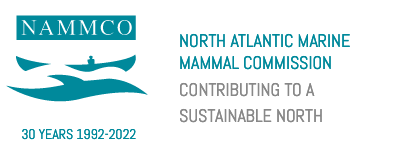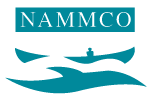Since 2019, NAMMCO has been organising an annual student symposium on marine mammals with the goal of connecting students working on projects in the same field with one another. In 2020 and 2021, the symposium was expanded to include online participants and facilitate networking opportunities among young researchers around the world. The event has been co-organised by the Norwegian Centre for the Law of the Sea since 2020, as well as the Arctic Biology department from the University of Tromsø in 2021.
The symposium gives a voice to students to present their research, whether completed or in conception, to their peers and receive feedback. It aims to connect students from different disciplines to discuss relevant topics in the field of marine mammal sciences from a biology, policy, user and indigenous perspective.
Take a look at previous years’ programmes here:
Event summary
The 6th annual Marine Mammal Student Symposium took place on Friday, 19th of April 2024. This event is co-organised by NAMMCO (North Atlantic Marine Mammal Commission), NCLOS – Norwegian Centre for Law of the Sea, and the Department of Arctic and Marine Biology, UiT – The Arctic University of Norway. The theme for the year was:
“Navigating Arctic Waters: Strengthening ties between Marine Mammal Research, Indigenous Knowledge & Law and Policy Making”.
The event happened in a hybrid format, online and in person, allowing for people from all over the world to participate. In total, there was 208 registered people from over 50 different countries all over the world.
The symposium was divided into a morning and an afternoon session, with the NAMMCO intern Marina Metić and NCLOS student Pierre Thevenoux serving as the moderators for the day. The morning session began with a welcome and short presentations of NAMMCO, NCLOS and AMB by the General Secretary Geneviève Desportes, researcher Endalew Lijalem Enyew, and associate professor Sophie Bourgeon respectively. Following the introduction, the first student session started, with five students, two in person and three online giving their presentations.
After the lunch break, the participants reconvened for another round of student presentations with one person presenting in person, and four giving their presentations online. The student presentations across the day covered a range of different topics, spanning both biology and law, and addressed a number of different themes, including climate change, genetics, behaviour, and legal regimes.
The last session of the day included presentations from three invited keynote speakers: Nikolas Sellheim (Sellheim Environmental), Emma Vogel (Department of Arctic and Marine Biology), and Endalew Lijalem Enyew (NCLOS). Following the presentation from keynote speakers, participants engaged in short but lively panel-like Q&A session with the speakers.
The day ended with informal networking, pizza, where students in person could meet others with similar interests, but also those with interests unlike their own, but with whom they might end up working together with in future.
NAMMCO considers the symposium to have been an overall success overall. We like to thank the students Celine Krüger, Gorana Morić, Jakub Piotr Kruszyński, Jessica Sagerer, and Pierre Thevenoux for their dedication throughout the organisation of the event.
Symposium program
MMSS-2024-Program-1Keynote speakers
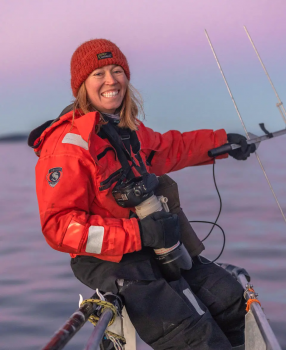
Dr Emma Vogel is a Postdoctoral Researcher in the Arctic Sustainability Lab at the University of Tromsø. Here, she collaborates with a team of researchers on interdisciplinary projects working towards sustainable management solutions by integrating ecology, data analytics, and social science approaches, involving analysing socio-ecological changes relevant to sustainability, such as biodiversity conservation and climate adaptation.
Emma completed her doctoral studies in Arctic Marine Biology at the University of Tromsø in 2023, focusing on how prey distributions impact the movements of marine mammal top predators. Her research concentrated on understanding the foraging behaviours of Killer whales, Humpback whales, and Sperm whales in relation to local fisheries. During this time, she also joined a multinational research project aimed to use acoustic deterrents to deter whales from dangerous interactions with fishing boats.
Before pursuing her academic career, Emma worked with the Humane Society of the United States, advocating for sustainable agricultural practices and animal protection at the local, state, and federal level. Her experiences underscore her commitment to environmental conservation and finding practical solutions for a more sustainable world.
Title of Emma’s presentation: Marine mammal tracking for management and mitigation
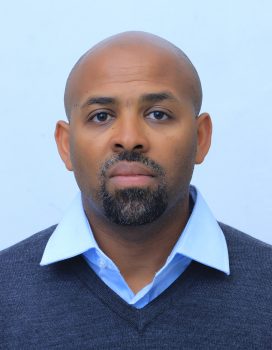
Endalew Lijalem Enyew (PhD) is a researcher at the Norwegian Center for the Law of the Sea (NCLOS), Faculty of Law, UiT-The Arctic University of Norway. His current research relates to the project “Developing good ocean governance of the Arctic in times of unpredictable and rapid changes (DOGA)”. Enyew’s research interest relates to the law of the sea, human rights law, indigenous peoples’ rights to marine space and resources, and critical legal theory focusing on Third World approaches to international law (TWAIL). Enyew has authored 2 books and several articles and book chapters on those fields, the most recent publication being his book on Indigenous Peoples, Marine Space and Resources, and International Law: The Interaction between the International Human Rights Law and the Law of the Sea (Routledge, 2024).
Title of Endalew’s presentation: Arctic Indigenous Peoples’ Right to Whaling: Making Sense of the IWC and NAMMCO Management Regimes

Dr Nikolas Sellheim is an independent consultant, running his own company Sellheim Environmental, working on international conservation law issues, livelihoods, and marine mammals. Together with Jessica Lefevre, Nikolas currently works on the Survey on Human and Indigenous Rights, and Aboriginal Subsistence Whaling for the International Whaling Commission (IWC).
Prior to his consulting work, he was a researcher at the Helsinki Institute for Sustainability Science (HELSUS), where he worked on a post-doc project entitled Livelihoods, cultures and local communities in international conservation law, funded by the Finnish Maj and Tor Nessling Foundation. He furthermore worked in the research project All Youth Want To Rule Their World (ALL-YOUTH) at the University of Helsinki throughout 2020. From 2017-18 he worked on the post-doctoral project Development of International Law on the Conservation of Marine Mammals at Polar Cooperation Research Centre (PCRC), Kobe University, Japan.
Nikolas holds a doctorate in law (2016) from the University of Lapland in Rovaniemi, Finland, in which he focused on the European Union’s ban on trade in seal products and the way Newfoundland sealers have been represented in the drafting process. The research included 3-month anthropological fieldwork in the sealing industry in Newfoundland.
Nikolas is co-Editor-in-Chief of Polar Record, the journal of the Scott Polar Research Institute, University of Cambridge, UK, published by Cambridge University Press. He is also a Fellow of the Polar Research and Policy Initiative (PRPI).
Nikolas has served as an observer to meetings of the International Whaling Commission, the Convention on International Trade in Endangered Species of Wild Fauna and Flora (CITES), the Convention on the Conservation of Migratory Species (CMS) and the Convention on Biological Diversity. He has furthermore attended and presented at academic conferences worldwide. Nikolas is the author of three monographs and co-Editor of four edited volumes. He has (co-) authored more than 40 peer-reviewed publications.
Title of Nikolas’ presentation: Shoreline perspectives, capital blindspots: Reimagining decision-making on seals
Event summary
On Friday the 24th of February NAMMCO, the Norwegian Centre for the Law of the Sea (NCLOS) and the University of Tromsø Marine Arctic Biology department hosted the fifth Marine Mammal Student Symposium titled
“Marine mammals in a changing Arctic: Finding a pathway for users, scientists, and policymakers to navigate new challenges”.
The symposium was for the second time jointly arranged by NAMMCO, NCLOS and UiT Arctic Biology and was held as a hybrid event (online and in-person), enabling people to participate from all over the world. In total, 110 people registered for the event from countries such as Norway and Iceland but also people from Canada and Somalia joined online. Students from the University of Oslo travelled to Tromsø for the symposium.
The symposium was divided into a morning and an afternoon session, with the NAMMCO intern Jana Djukarić and student Fabiola Azevedo Dos Santos Silva serving as the moderators for the day. The morning session began with a welcome and short presentations of NAMMCO, NCLOS and Arctic Biology by the General Secretary Geneviève Desportes, Professor Ingvild Jakobsen and Sophie Bourgeon respectively. Then the first session of students talks commenced which resulted in an icebreaker session for the students to start to get to know each other and exchange information.
After a lunch break with delicious vegetarian pizzas, the participants reconvened for another round of student presentations and another break out session to discuss the presentations in small groups. The student presentations across the day covered a range of different topics, spanning both biology and law, and addressed a number of different themes, such as telemetry, physiology, bycatch, stress assessments, and the possible effects of deep seabed mining on marine mammals.
The afternoon session also included presentations from three invited keynote speakers: Sara Olsvig (ICC Greenland), Mads Peter Heide-Jørgensen (Greenland Institute of Natural Resources) and Professor Ingvild Jakobsen (NCLOS).
NAMMCO considers the symposium to have been a success overall, although time for breakout sessions was limited due to many presentations which requires attention for future symposiums. We like to thank the students Fabiola Azevedo Dos Santos Silva, Jasper Neuman, Marc Rams i Ríos and Roxane Elvire Jocelyne Lannoy for their dedication throughout the organisation of the event.
Program
program-mmss-2023
Keynote speakers

Sara Olsvig is the International Chair of the Inuit Circumpolar Council. Olsvig served as member of the Parliament of Denmark (2011 – 2015) and the Parliament of Greenland (2013 – 2018) and has been leader of Greenlandic political party Inuit Ataqatigiit. Olsvig was Vice Premier and Minister of Social Affairs, Families, Gender Equality and Justice in the Government of Greenland from 2016 to 2018. Olsvig has also served as Chair of the Standing Committee of Parliamentarians of the Arctic Region.
 Mads Peter Heide-Jørgensen is a professor at the Greenland Institute of Natural Resources and the University of Copenhagen with more than 40yrs experience with field work and studies of marine mammals, mainly from work in Greenland but also from studies in Canada, Russia, the US, the Antarctic, Brazil, Mexico and Argentina. Heide-Jørgensen is a longstanding member of NAMMCOs Scientific Committee with heavy involvement in the management of the hunt of whales in Greenland and the political conflict between users and scientists. Heide-Jørgensen has pioneered several novel methods for satellite tracking and biologging studies of marine mammals.
Mads Peter Heide-Jørgensen is a professor at the Greenland Institute of Natural Resources and the University of Copenhagen with more than 40yrs experience with field work and studies of marine mammals, mainly from work in Greenland but also from studies in Canada, Russia, the US, the Antarctic, Brazil, Mexico and Argentina. Heide-Jørgensen is a longstanding member of NAMMCOs Scientific Committee with heavy involvement in the management of the hunt of whales in Greenland and the political conflict between users and scientists. Heide-Jørgensen has pioneered several novel methods for satellite tracking and biologging studies of marine mammals.
Ingvild Ulrikke Jakobsen is Professor and Director of the Norwegian Centre for the Law of the Sea (NCLOS), Faculty of Law, UiT the Arctic University of Norway. Jakobsen has taught and published extensively within international law of the sea and environmental law. Her PhD was on marine protected areas in international law and was completed in 2010. Jakobsen has broad experience as a research project leader. She is currently the project leader of the project Developing Good Ocean Governance in the Arctic in times of rapid and unpredictable changes, funded by the Norwegian Research Council.
Event summary
The North Atlantic Marine Mammal Commission (NAMMCO), in association with the Norwegian Centre for the Law of the Sea (NCLOS) and the University of Tromsø Arctic Biology department, recently hosted an online symposium for students working with marine mammals, titled:
“Connecting scientists, policy-makers and users: How can we cooperate to safeguard marine mammals and their environment”
NAMMCO arranged its first Marine Mammal Student Symposium in 2019, with an intention that this became an annual event. A symposium has been arranged every year since, with the dual purpose of promoting the work NAMMCO does amongst early career marine mammal scientists and creating networking opportunities. In 2022, the symposium was for the second time jointly arranged by NAMMCO and NCLOS (and for the first time with UiT Arctic Biology) and due to uncertainty of how Covid-restrictions would evolve, was held as a hybrid event (online and in-person). The online platform created an opportunity to include students from all over the world, and 83 participants registered for the event from countries such as Norway, Ireland, Finland, United Kingdom and the Philippines.
The symposium was divided into a morning and an afternoon session, with the NAMMCO Scientific Secretary Heleen Middel serving as the moderator for the day. The morning session began with a welcome from Heleen with some house rules for the day (especially for online participants). This was followed by short presentations of NAMMCO and NCLOS by the General Secretary Geneviève Desportes and Professor Ingvild Jakobsen respectively. This was then followed by an icebreaker session for the students to start to get to know each other and exchange information, which was organised in breakout rooms of six people each. The morning session was rounded out with a series of 9 student presentations, and 2 short break-out groups to discuss the presentations.
After a lunch break, the participants reconvened for another round of student presentations and another break out session to discuss the presentations in small groups. The student presentations across the day covered a range of different topics, spanning both biology and law, and addressed a number of different themes, such as telemetry, bycatch, abundance surveys, and regulations on marine mammals as well as fishery related talks.
The afternoon session also included a presentation from two invited keynote speakers: Richard Caddell (University of Cardiff, Law of the Sea) and Victoria Buschmann (Greenland Institute of Natural Resources, Conservation Biology).
The day concluded with a presentation by Martin Binachon (previous NAMMCO intern) on user knowledge being integrated into research to inspire the second breakout session, following by discussion back in the plenary to bring it back to the Symposium theme.
An evaluation survey has been circulated amongst the participants and responses will be collected in order to aid next year’s symposium to run even smoother. NAMMCO considers the symposium to have been a success overall, although the balance between participants and presenters with a background in science compared to law was tilted towards science (like last year too), which requires attention for future symposiums.
Program
programme
Keynote speakers:
 Dr. Victoria Qutuuq Buschman is an Inuk wildlife and conservation biologist from Utqiaġvik, Alaska, though she now makes her home permanently in Nuuk, Greenland. She has lived and worked across the Arctic in an effort to study how Indigenous peoples fundamentally shape Arctic biodiversity conservation, from research, to management, to actualizing the dreams of new protected areas.Her role in research has been to challenge the colonial legacy of conservation and instead promote partnerships with Indigenous communities, knowledge, and governance to develop ethically-conscious, culturally-relevant, and fully knowledge-based conservation efforts in the Arctic.
Dr. Victoria Qutuuq Buschman is an Inuk wildlife and conservation biologist from Utqiaġvik, Alaska, though she now makes her home permanently in Nuuk, Greenland. She has lived and worked across the Arctic in an effort to study how Indigenous peoples fundamentally shape Arctic biodiversity conservation, from research, to management, to actualizing the dreams of new protected areas.Her role in research has been to challenge the colonial legacy of conservation and instead promote partnerships with Indigenous communities, knowledge, and governance to develop ethically-conscious, culturally-relevant, and fully knowledge-based conservation efforts in the Arctic.
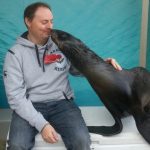
Dr Richard Caddell is a Reader in Law at Cardiff University, UK, where he specialises in the law of the sea and international environmental law, with a particular interest in marine mammal law. He completed his PhD thesis on the international regulation of cetaceans and has written extensively about marine mammal and fisheries issues. He is the author of Migratory Species in International Law: Challenges of Transboundary Conservation (2022) and co-editor of Wetlands and International Environmental Law: The Evolution and Impact of the Ramsar Convention (2022), Research Handbook on Climate Change and Biodiversity Law (2022), Strengthening International Fisheries Law in an Era of Changing Oceans (2019), and Shipping, Law and the Marine Environment in the Twenty-First Century (2013). Richard is Editor-in-Chief of the Journal of International Wildlife Law and Policy and regularly advises national and intergovernmental bodies on marine and environmental law.
Event summary
The North Atlantic Marine Mammal Commission (NAMMCO), in association with the Norwegian Centre for the Law of the Sea (NCLOS), recently hosted an online symposium for students working with marine mammals, titled:
“Marine Mammal Management in the Arctic: Between Scientific and Legal Perspectives”
NAMMCO arranged its first Marine Mammal Student Symposium in 2019, with an intention that this became an annual event. A symposium has been arranged every year since, with the dual purpose of promoting the work NAMMCO does amongst early career marine mammal scientists and creating networking opportunities. In 2021, the symposium was for the first time jointly arranged by NAMMCO and NCLOS and due to Covid-restrictions, was held online. The online platform created an opportunity to include students from all over the world, and 74 participants registered for the event from countries such as Canada, Greenland, Norway, Denmark, France, Germany, Greece and Turkey.
The symposium was divided into a morning and an afternoon session, with the NAMMCO Scientific Secretary Fern Wickson serving as the moderator for the day. The morning session began with a welcome from current and previous interns at NAMMCO, Mana Tugend and Nicolai Scherdin. This was followed by short presentations of NAMMCO and NCLOS by the General Secretary Geneviève Desportes and Professor Vito De Lucia respectively. This was then followed by an icebreaker session for the students to start to get to know each other and exchange information, which was organised in breakout rooms of six people each. The morning session was rounded out with a series of 9 student presentations, and 2 short break out groups to discuss the presentations.
After a lunch break, the participants reconvened for 5 additional student presentations and another break out session to discuss the presentations in small groups. The student presentations across the day covered a range of different topics, spanning both biology and law, and addressed a number of different themes, such as bioacoustics, eDNA, plastic pollution, noise pollution, stock assessments and regulations on marine mammals. The extremely high quality of all the presentations was highlighted by several participants during the break out discussions.
The afternoon session also included a presentation from an invited keynote speaker, Dr. Nikolas Sellheim, titled: “Arctic States and the International Management of Marine Mammals.”
The day concluded with a poll and discussion on the following question: “How can Scientific and Legal Minds Collaborate Effectively to Achieve Common Management Goals for Marine Mammals?” The goal was to have participants realise how crucial this collaboration is, as well as identify potential difficulties encountered and discuss how it could be improved in the future.
An evaluation survey has been circulated amongst the participants and responses will be collected in order to aid next year’s symposium to run even smoother. NAMMCO considers the symposium to have been a success overall, although the balance between participants and presenters with a background in science compared to law was tilted towards science, which requires attention for future symposiums.
Program
Keynote speaker
 Nikolas Sellheim holds a PhD in law from the University of Lapland, Rovaniemi, Finland. His primary research focuses on international conservation law and in particular marine mammals. He has published extensively on the EU Seal Regime and on international marine legal issues. Nikolas is co-Editor-in-Chief of Polar Record, the journal of the Scott Polar Research Institute, University of Cambridge, UK.
Nikolas Sellheim holds a PhD in law from the University of Lapland, Rovaniemi, Finland. His primary research focuses on international conservation law and in particular marine mammals. He has published extensively on the EU Seal Regime and on international marine legal issues. Nikolas is co-Editor-in-Chief of Polar Record, the journal of the Scott Polar Research Institute, University of Cambridge, UK.
Event summary
Lacking a marine mammal research institutes, the master and PhD students conducting marine mammal related projects in Tromsø are divided and dispersed at different departments and throughout town (Department of Arctic Biology, Norwegian College for fishery science and K.G. Jebsen Centre for the Law of the Sea at UiT, the Institute of Marine Research, the Norwegian Polar Institute, various master programs).
With little contact between the different departments NAMMCO arranged for a second Marine Mammal Student Symposium, where marine mammal students and the intern at the Secretariat share their work and issues, as well as make new connections. The symposium was co-arranged with the university.
The one-day symposium was held 5th February 2020 and attracted around 30 attendees, including one student from Trondheim. A total of 7 students presented their work. The presentations were from various Norwegian biological research institutes, as well as the Norwegian Centre for Law of the Sea. After the student presentations, there were an interactive session, aiming to help student and junior scientists to build the skills necessary for achieving enhanced cooperation and interdisciplinarity and make a difference as a scientist in a changing Arctic.
The day ended with three talks “The new agreement on marine biodiversity in areas beyond national jurisdiction” presented by Dr. Vito De Lucia, Associate Professor at the Norwegian Centre for the Law of the Sea, “Going far and beyond with autonomous systems” by Dr. Sofia Aniceto, VISTA postdoc. at the Norwegian College of Fishery Science department and “environmental DNA in Marine Mammal Research” by Prof. Kim Præbel, Professor from the Norwegian College of Fishery Science. These inspiring talks captured the complexity of performing research in the Arctic and the Northern European Seas.
The students were very satisfied with the recurring symposium, confirmed by feedback on the day and the survey send out afterwards. In addition, professors from Norwegian Centre for the Law of the Sea and the Norwegian College of Fishery Science both expressed interest in cooperating with NAMMCO at future symposia.
Program
program_mmss_finalKeynote speakers
Vito De Lucia is Associate Professor at the Norwegian Centre for the Law of the Sea (NCLOS), UiT The Arctic University of Norway. His most immediate research interests are located at the intersection of critical theory, law and ecology. His current research agenda focuses on the concept of commons in international law, on the negotiations towards a new global treaty on marine biodiversity in areas beyond jurisdiction (BBNJ) and on Arctic governance. He is author of The Ecosystem Approach in International Environmental law. Genealogy and Biopolitics (Routledge, 2019).
Sofia Aniceto holds a postdoctoral position at the Norwegian College of Fishery Science department. She works on technology development for the environmental sector on a project titled spatial and temporal analysis of marine mammal vocalizations using unmanned systems. Her main interests in research is related to survey technologies, anthropogenic effects over marine mammals, species interactions, and behaviour. Aniceto did her PhD project “Unmanned aerial vehicles for marine mammal surveys in arctic and sub-arctic regions”, at Akvaplan-niva, on the development and application of unmanned sampling technologies for marine environmental surveys and monitoring activities.
Kim Præbel is a professor at the Norwegian College of Fishery Science and leads the research group Genetics. The group focus on the genetics and molecular ecology of sub-Arctic and Arctic fishes and other vertebrates and invertebrates. It also has a strong focus on using environmental DNA (eDNA) to study interactions between aquaculture species and the environment and for studies of Arctic biodiversity. His research interests lie within the fields of evolution, molecular ecology and environmental genomics. The climate crisis and how it impacts our ecosystems is also a topic he studies from a conservation and ecological point of view.
Event summary
Background
There is no dedicated marine mammal research group at the University of Tromsø, and thus biology students wishing to conduct marine mammal related projects are divided mainly between the Institute of Marine Research, the Norwegian Polar Institute, and the Department of Arctic Biology at UiT. We therefore thought it would be a good idea to create an event where marine mammal students could get together and share their work with both each other and the public, and to make connections within the field.
The symposium
The 15 student presentations were divided into the sections “Threats”, “Welfare/diet”, “Law of the Sea”, “Physiology” and “Movement/abundance”. The evening event consisted of the talks “NAMMCO and International Law: What makes an organisation “appropriate” for the conservation and management of marine mammals?” by Cardiff University’s Richard Caddell, “Responsible whale watching?” by UiT’s Anniken Førde, and “Ongoing research on walrus, beluga and bowhead whales” by the Norwegian Polar Institute’s Christian Lydersen.
During the activity organised for the presenters, the students were put into four small groups, each with a discussion topic or question designed to encourage reflection and consideration of their projects and issues involving marine mammals. The four subjects of the discussion were: “What are the biggest challenges connected to your work?”; “From all the talks given today, do you see any overlapping issues and/or potential for collaboration?”; “What do you imagine doing when you finish your current project/studies? Do you want to continue working on the same topic?”; and “What are the arguments for and against using marine mammals and a food resource?”. After a short period of discussion in which participants were encouraged to write their responses, the groups were made to disperse and choose a different question (independently of those they had previously sat with). After four rotations, everybody had addressed all the discussion points, with new people engaging each other in each iteration. A final plenary session, lead by the chair and involving all participants, took each topic in turn for an overall discussion. A quick evaluation of the day so-far from the perspectives of the presenters was also made, and many commented on the positive outcomes for networking and building connections between fields.
Fern Wickson, the Scientific Secretary of NAMMCO, took on the role of chair for the entire day, and she did an excellent job of engaging the audience, keeping time and facilitate good discussions during the group discussion session. Coffee, tea and snacks were served in-between the different sections, and the students were served pizza between the group activity and evening event. At least 60-70 people attended the Symposium, with the majority being there for the entire day.
The Symposium went very well, with excellent student presentations, a good discussion session and three completely different and engaging guest lectures in the evening. We got great feedback from both students and attendees throughout the day as well as the following days, and we consider the Symposium such a success that we want to make it a recurring event. A questionnaire was sent out to the students to provide us with feedback for planning the next NAMMCO Marine Mammal Student Symposium.
Program
mmss_program_finalKeynote speakers
Dr Richard Caddell is a Lecturer in Law at Cardiff University, from which he also gained his PhD, examining the international regulation of cetaceans. Richard’s primary research interests lie in the law of the sea and international environmental law, particularly marine mammal issues, fisheries governance, marine conservation and Polar law. He is the co-editor of Strengthening International Fisheries Law in an Era of Changing Oceans (Hart, 2019) and Shipping, Law and the Marine Environment in the Twentieth Century (Lawtext, 2013), and has published numerous legal articles on marine mammals, migratory species and Arctic regulation. He regularly advises national governments, inter-governmental bodies and NGOs on environmental and marine issues and is an academic member of Francis Taylor Building, the UK’s foremost Environment Law set of barristers.
Anniken Førde is an associate professor in Planning and Culture at the Department of Social Sciences, UiT. Her research focus on transformation of coastal communities and landscapes, and she has for many years worked on responsible tourism development. In the ongoing research project Whalefeast; Ecoligical, commercial and social challenges of the recent extreme winter arrivals of whales in Northern Norway, she is part of a team looking at strategies for securing responsible whale watching practices.
